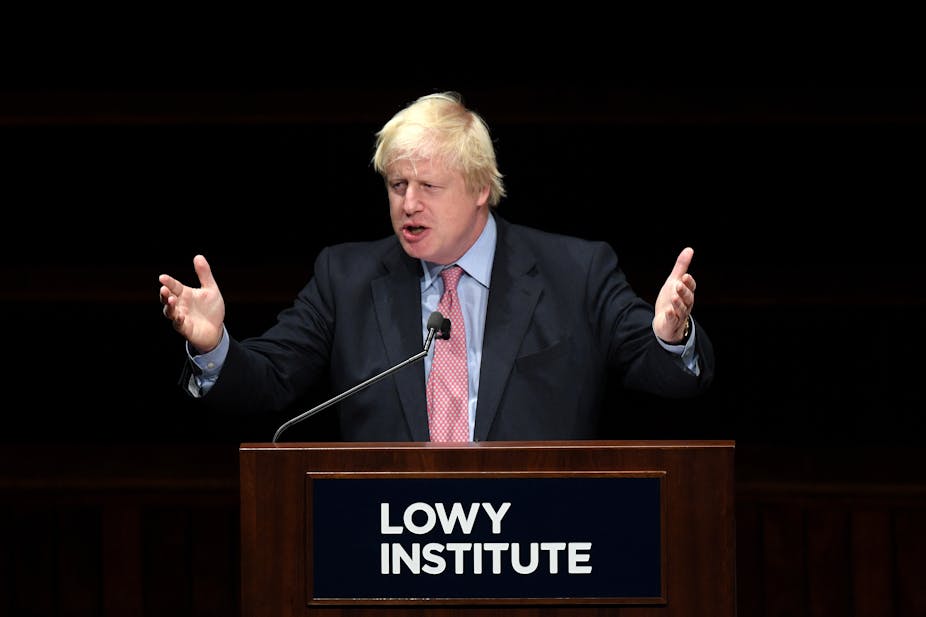British Foreign Secretary Boris Johnson came to the Sydney Town Hall on Thursday night for an event organised by the Lowy Institute. Judging by a rapturous reception, he beguiled a crowd of journalists, policy wonks and politicians.
That would not have been difficult in the circumstances given the suspension of disbelief that seems to accompany these sorts of events in which the great and the good from far away give us the benefit of their wisdom.
Media coverage of Johnson reflected this tendency.
What a funny chap, he is; although, it must be said, his mastery of the Australian vernacular leaves something to be desired? Whatever he absorbed in his gap year at Geelong Grammar it was hardly command of the idiom.
Putting all that nonsense aside, let’s stand back and ask the question: what was the point of the Johnson speech, and its relevance for his Australian audience?
The short answer is that he was trying to use his few days in the Antipodes to score some political points at home, and alternately charm his Australian audience as fellow members of the Anglosphere – whatever that might mean these days.
Johnson fell back on reference to Winston Churchill when he conferred his own blessing on the “special genius of English-speaking peoples” and, by extension, our membership of this exclusive club.
For my part I think we must be careful to avoid any such conceit or complacency that English-speakers are especially blessed. But it is certainly true that there is a series of interconnected ideas that have been highly successful.
They are democracy, the rule of law, habeas corpus, an independent judiciary, the absolute freedom to make fun of politicians, and above all the freedom to live your life as you please provided you do not harm the interests of others.
So endeth the Anglosphere lesson that seemed partly designed to draw Australia into Britain’s corner in the potential traumas that will accompany that country’s departure from the European Union.
Australia, he told us, would be first in line for a post-Brexit free-trade agreement. That might be a useful idea, but Australia’s trade diplomats should devote significant energy first to securing an FTA with the EU, since trade with that behemoth dwarfs our commercial relationship with Britain.
In all of this Johnson drew a particularly long bow when he posed the question that what if Australia had itself sought membership of the EU, with all the constraints that might apply.
What if the humble Violet Crumble had been subject to the tyranny of Brussels?
Indeed, what indignities would we have endured?
Well, that line of reasoning might have been deployed as a debating point at the Oxford Union. But it is hardly relevant to an Australian consideration of a changing global environment.
Australia never aspired to membership of the Common Market, although some of its politicians might have felt more comfortable in the halls of Westminister or viewing the cricket from the balcony at Lord’s – than in emerging Asia.
It could be argued that the Treaty of Rome was the best thing that ever happened to us since it helped expedite our engagement with Asia, and dissipated whatever illusions might have prevailed about our future as a European outpost.
Johnson’s broader point that Britain is itching to exit the European Community and navigate its own way free of the constraints that currently apply is a perfectly reasonable political point. But he was coming the raw prawn when he told his audience that Brexit was the “overwhelming desire of the British people”.
What a load of tosh.
Polls consistently show a fine margin either way for and against Brexit. Indeed, in the recent British election exit polls indicated that unhappiness with the Brexit process contributed significantly to the ruling Conservatives’ poor result. This was especially so in the south of the country, where Remain sentiment is strong.
Johnson, as one of the saboteurs of David Cameron’s lame attempts to keep Britain in the European Community, needs to justify his position. He is, after all, when all is said and done, a politician, and one who aspires to lead his own party. He is not about to admit error, and certainly not on foreign soil.
Johnson’s remarks about security in the Asia-Pacific are welcome, if they represent any more than boilerplate statements by a visiting official.
In the South China Sea, we urge all parties to respect freedom of navigation and international law, including the ruling of the Permanent Court of Arbitration in The Hague.
We are also ready once again to articulate our commitment to international order with money and military presence … That is why one of the first missions of our two vast new aircraft carriers will be to sail through the Straits of Malacca, the route that currently accommodates a quarter of world trade.
If you look at these vessels you will see that they are not only longer than the Palace of Westminster but more persuasive than most of the arguments you will hear in the House of Commons.
Johnson wisely avoided reference to the last time Britain sought to rule the waves in the Asia-Pacific. On December 10, 1941, the sinking of the battleship Prince of Wales and the battlecruiser Repulse by Japanese bombers off Malaysia represented one Britain’s greatest naval disasters, and bleakest days in the second world war.

